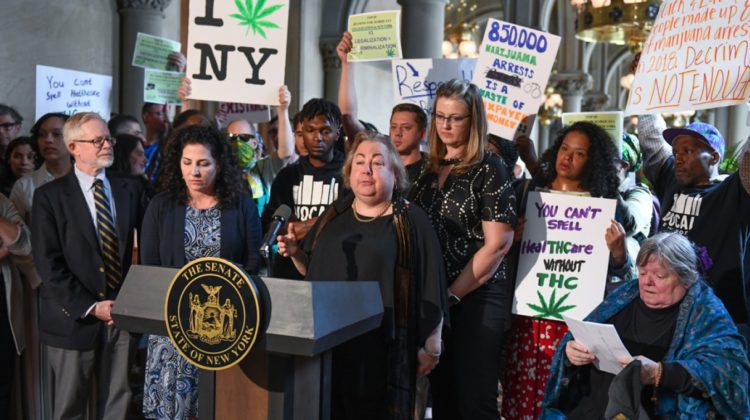
UPDATE* March 31, 2021 – “I just signed legislation legalizing adult-use cannabis,” Governor Cuomo said in a statement. “The bill creates automatic expungement of previous marijuana convictions that would now be legal. This is a historic day. I thank the Leader and Speaker and the tireless advocacy of so many.”
Picture Above* Sen. Liz Krueger speaking about cannabis legalization. Photo courtesy of the New York State Senate.
On Saturday, March 27th, New York lawmakers agreed on a bill to legalize recreational cannabis use for adults 21 and over. If passed, the legislation would allow dispensaries in the state to start selling cannabis as soon as December 2022, paving the way for a $4.2 billion industry by 2027, according to the New York Cannabis Legalization Market Opportunity Analysis.
The state legislature is expected to vote on the bill in the upcoming week. If passed, the legislation takes effect immediately.
What is in the Legislation?
The New York State budget proposal, which is due April 1st, allows New Yorkers to possess up to 3 ounces of cannabis concentrates and store up to 5 pounds of flower at home for personal consumption. It also permits individuals to grow up to six plants at home, with households limited to 12 plants. Cultivation, however, will likely not begin until officials set regulations. Officials expect to create rules regarding medical home grows within six months. But it may take up to 18 months before residents can grow recreationally.
The proposal, which Gov. Andrew Cuomo deems “essential,” creates tens of thousands of jobs while raking in millions in tax revenue. Specifically, Cuomo’s administration estimates that sales will generate as much as $350 million per year.
The bill would create a 9% tax on retail sales, and up to a 4% local tax. Seventy-five percent of local earnings will go to municipalities and 25% to counties. Cannabis distributors would also see a THC tax. That includes: 5¢ per mg for flower, 8¢ per mg for concentrated cannabis, and 3¢ per mg for edibles, said Democrat Sen. Liz Krueger – the bill’s sponsor – in a New York State Senate press release.
Tax revenue will cover the cost of legalization before supporting other initiatives. State officials will then direct 40% to community reinvestment projects; 40% to public education programs; and 20% to drug treatment, prevention and education facilities.
The legislation also calls for an Office of Cannabis Management (OCM). The OCM will operate as part of the New York State Liquor Authority, and regulate the recreational market as well as the existing medical cannabis and hemp programs.
The OCM would report to a five-member Cannabis Control Board. The governor appoints three board members, and the Senate and Assembly appoint one member each.
Rooted in Social Equity
The legislation supports racial justice, economic growth and small businesses, said Krueger. It also focuses on eliminating the illegal cannabis market.
To accomplish these goals, the bill establishes a chief equity officer and cannabis advisory board, which will represent community interests and approve grants for the Community Reinvestment Fund.
The fund would reinvest a large percent of revenue in communities most impacted by the War on Drugs. Those include minority communities, women, disabled veterans, and financially distressed farmers.
Additionally, the OCM will issue half of the cannabis business licenses to social equity applicants, according to the Senate’s press release. This comes after New Yorkers criticized the governor’s legalization plan for leaving out people of color and allowing wealthy businesses to bid on the limited number of cannabis licenses.
In an effort to further amend social inequity, New Yorkers previously convicted of cannabis-related activities will have their records automatically expunged, according to the bill.
What This Means for Dispensaries
The New York State Cannabis Control Board would create a licensing system for commercial cultivators, processors, distributors, retailers, cooperatives and nurseries. However, officials will prohibit vertical integration, except for microbusinesses. This bans the cultivation, extraction, manufacturing and distribution of cannabis within a single facility.
Dispensaries will be able to sell their products on-site at retail locations and online with delivery services. Consumption will also be allowed to take place on dispensary premises.
Individual municipalities can opt-out of allowing retailers or social consumption sites from opening shops until the end of 2021. However, residents can vote to override these bans through a local referendum.
What This Means for New Yorkers
If the legislation passes, police will not be able to use the smell of cannabis to justify searching people, according to the bill. Other provisions would also be rolled back to require evidence of criminal activity.
Additionally, the State Department of Health would oversee studies directed toward technologies for identifying cannabis-impaired drivers.
The bill also has the potential to expand New York’s existing list of qualifying conditions for medical cannabis use. This would allow patients to obtain up to a 60-day, rather than its current 30-day, supply. Smokable hemp flower sales, which were left out of the state’s previous hemp regulations, would also be permitted.
This bill accelerates the years-long battle to legalize recreational cannabis use in New York. It would also boost the state’s economy after the pandemic. With New Jersey’s recent legalization of recreational cannabis, New York lawmakers are pressured to keep up the momentum and reap the benefits of cannabis tax revenue.


Leave a Reply